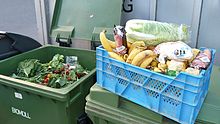
Back خضرية مجانية Arabic Freeganisme Catalan Freeganismus Czech Ffriganiaeth Welsh Friganisme Danish Freeganismus German Friganismo Esperanto Friganismo Spanish Freeganism Estonian Freeganismo Basque
| Part of a series on |
| Anti-consumerism |
|---|


Freeganism is an ideology of limited participation in the conventional economy and minimal consumption of resources, particularly through recovering wasted goods like food.[1] The word "freegan" is a portmanteau of "free" and "vegan".[2] While vegans avoid buying, consuming, using, and wearing animal products as an act of protest against animal exploitation, freegans—at least in theory—avoid buying anything as an act of protest against the food system in general.
Freeganism is often presented as synonymous with "dumpster diving" for discarded food, although freegans are distinguished by their association with an anti-consumerist and anti-capitalist ideology and their engagement in a wider range of alternative living strategies, such as voluntary unemployment, squatting in abandoned buildings, and "guerrilla gardening" in unoccupied city parks.[3]
The 2013 film The East was based in Freeganism and related practices such as Anarchist Communalism. Director Zal Batmanglij and star Brit Marling co-wrote the film and the script was largely based on their experiences practicing Freeganism in the summer of 2009. [4]
- ^ Barnard, Alex (2016). Freegans: Diving into the Wealth of Food Waste in America. Minneapolis, MN: University of Minnesota Press. ISBN 978-0-8166-9813-4.
- ^ Glowka, Wayne (2004). "Among the New Words" (PDF). American Speech. 79 (2): 194–200. doi:10.1215/00031283-79-2-194. Archived from the original (PDF) on 2006-09-07. Retrieved 2016-06-09.
- ^ "Freeganism in Practice". freegan.info. Retrieved 2016-06-09.
- ^ Hogan, Michael (January 22, 2013). "Brit Marling, 'The East' Star And Co-Writer, Spent A Summer Eating From Dumpsters". The Huffington Post. Retrieved January 24, 2013.
© MMXXIII Rich X Search. We shall prevail. All rights reserved. Rich X Search